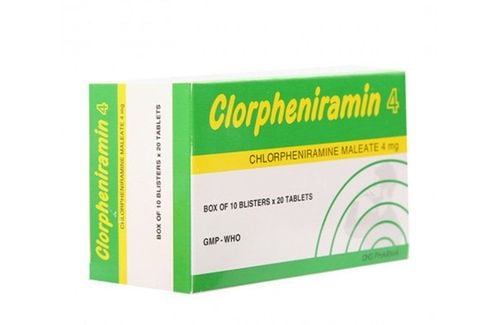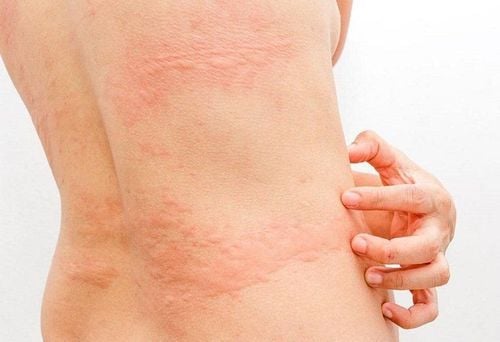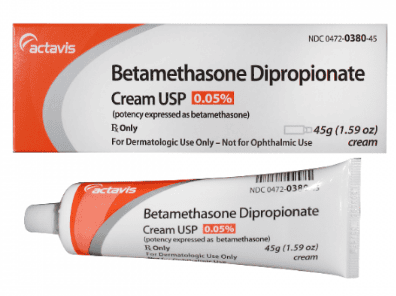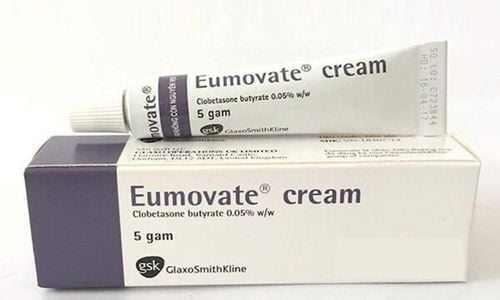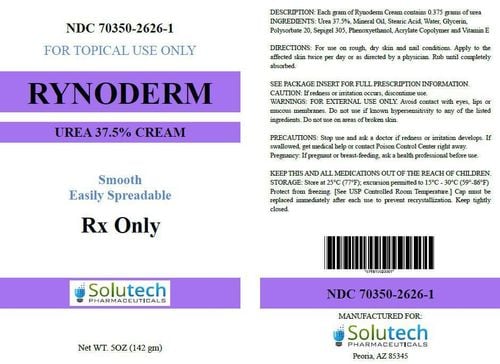This is an automatically translated article.
Valizyg eczema cream is indicated in the treatment of cases of dermatitis, skin allergies that respond to corticosteroids... Let's learn about the uses and notes when using Valizyg eczema cream through the article below.
1. Uses of the drug valizyg eczema cream
Valizyg eczema cream contains the active ingredient Betamethasone Valerate Cream USP equivalent to Betamethasone USP 0.1% in the form of a topical cream. Betamethasone belongs to the group of corticosteroids with strong anti-inflammatory, anti-allergic and immunosuppressive properties used in the treatment of corticosteroid-responsive disorders. Betamethasone's Glucocorticoid activity is very strong while Mineralcorticoid's activity is negligible. The effect of Betamethasone affects the body's metabolism, and at the same time reduces the body's resistance to stimulants. Valizyg eczema cream is indicated in cases of dermatitis, allergic skin reactions to corticosteroids such as contact dermatitis, seborrheic dermatitis, children's eczema, psoriasis, neurodermatitis.
2. Dosage of Valizyg eczema cream
Valizyg eczema cream is used by applying externally to the damaged skin. The recommended dose of the drug is to apply 3 times a day and maintain until the effect is achieved. However, the patient should consider the effectiveness of therapy if the condition does not improve after 2 weeks of treatment.
Valizyg eczema cream must be used within 3 months after opening.
3. Valizyg eczema cream side effects
Valizyg eczema medicine can cause some side effects as follows:
Common side effects are itching, irritation of the skin where the medicine is applied; Local reactions have been reported with topical corticosteroids and the risk is increased when patients wear tight clothing. Reactions listed in decreasing frequency include irritation, dryness, acne, bruising, allergic contact dermatitis, secondary bacterial infection, wrinkling of the skin, perspiration; Topical corticosteroids can be partially absorbed through the body and cause adrenal insufficiency, Cushing's syndrome, urinary glucose, and hyperglycemia in some patients. Patients need to stop using Valizyg eczema cream and notify the treating doctor when experiencing unwanted effects.
4. Note when using Valizyg eczema cream
4.1. Contraindications Contraindicated to use Valizyg eczema cream in the following cases:
Patients with a history of hypersensitivity to Betamethasone or any ingredient of Valizyg eczema cream; People with chickenpox, skin infections, Herpes disease, ringworm. 4.2. Precautions for use Systemic absorption of corticosteroids can lead to adrenal insufficiency and glucocorticoid depletion after discontinuation of therapy. There have been reports of the risk of Cushing's syndrome, hyperglycemia, and hyperglycemia in patients due to systemic absorption of corticosteroids. Factors that increase drug absorption into the system include large-scale application, extensive application to damaged skin, wearing tight clothing and prolonged use of the drug.
In case the patient develops symptoms of irritation, it is necessary to stop using Valizyg eczema cream and switch to another compatible drug. Corticosteroid contact atopic dermatitis is diagnosed by observation of a wound that takes longer to heal than it is clinically.
For pregnant women: There are no specific studies on the use of Valizyg eczema cream in pregnant women, so it is not recommended to use Valizyg eczema cream in this population unless indicated by doctor based on benefits and risks.
For women who are breastfeeding: Betamethasone is excreted in breast milk, so caution should be exercised when using the drug in lactating women.
For children: The safety and effectiveness of Valizyg eczema cream when used in children have not been established. Due to the larger skin surface area ratio in children, the risk of adrenal insufficiency, Cushing's syndrome is higher when treated with corticosteroids... Some undesirable reactions have been reported clinically when Corticosteroid use in children. Therefore, it is recommended to limit treatment with Valizyg eczema cream in children.
5. Drug interactions Valizyg eczema cream
Concomitant use of Valizyg eczema cream and drugs Phenytoine, Phenobarbital, Rifampicine or Ephedrine may increase the metabolism of Betamethasone and decrease the therapeutic effect.
Concomitant use of Valizyg eczema cream and Estrogen should be monitored for the effectiveness of corticosteroids.
The risk of hypokalemia is increased with concomitant use of corticosteroids and potassium-depleting diuretics.
The risk of arrhythmias and digitalis toxicity is increased when used with corticosteroids.
Corticosteroids used together with the anticoagulant Coumarine increase or decrease the anticoagulant effect of Coumarine. If co-administration is required, the dose should be adjusted.
Combined use of corticosteroids and non-steroidal anti-inflammatory drugs or alcohol increases the risk of peptic ulcer disease.
Caution should be used when combining corticosteroids with Acetyl Salicylic Acid in patients with decreased prothrombin.
Betamethasone in particular and Corticosteroids in general can reduce blood salicylate.
The dose of antidiabetic drugs may have to be treated when used in combination with blood corticosteroids.
Drug interactions occur that increase the risk of having effects and reduce the treatment effect of Valizyg eczema cream, so to ensure safety and effectiveness in treating patients, it is necessary to inform the doctor about the drugs, Food being used before taking Valizyg eczema cream.
Hopefully, the above sharing will help you better understand the use and use of Valizyg eczema cream. If you have any further questions, you can contact your doctor or pharmacist for in-depth advice.
Please dial HOTLINE for more information or register for an appointment HERE. Download MyVinmec app to make appointments faster and to manage your bookings easily.




